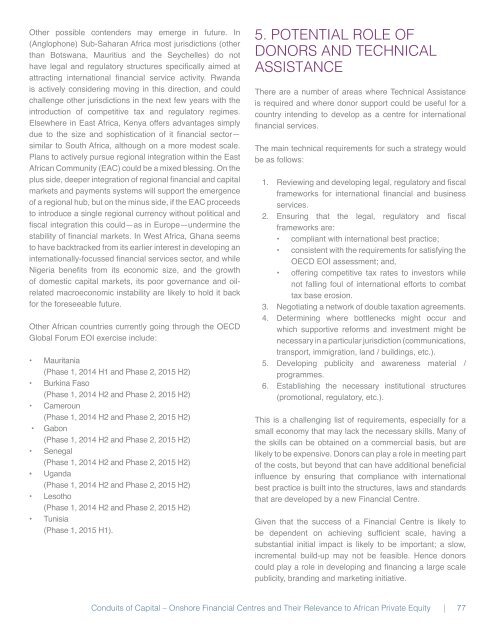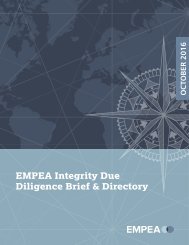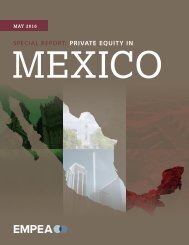Create successful ePaper yourself
Turn your PDF publications into a flip-book with our unique Google optimized e-Paper software.
Other possible contenders may emerge in future. In<br />
(Anglophone) Sub-Saharan Africa most jurisdictions (other<br />
than Botswana, Mauritius and the Seychelles) do not<br />
have legal and regulatory structures specifically aimed at<br />
attracting international financial service activity. Rwanda<br />
is actively considering moving in this direction, and could<br />
challenge other jurisdictions in the next few years with the<br />
introduction <strong>of</strong> competitive tax and regulatory regimes.<br />
Elsewhere in East Africa, Kenya <strong>of</strong>fers advantages simply<br />
due to the size and sophistication <strong>of</strong> it financial sector—<br />
similar to South Africa, although on a more modest scale.<br />
Plans to actively pursue regional integration within the East<br />
African Community (EAC) could be a mixed blessing. On the<br />
plus side, deeper integration <strong>of</strong> regional financial and capital<br />
markets and payments systems will support the emergence<br />
<strong>of</strong> a regional hub, but on the minus side, if the EAC proceeds<br />
to introduce a single regional currency without political and<br />
fiscal integration this could—as in Europe—undermine the<br />
stability <strong>of</strong> financial markets. In West Africa, Ghana seems<br />
to have backtracked from its earlier interest in developing an<br />
internationally-focussed financial services sector, and while<br />
Nigeria benefits from its economic size, and the growth<br />
<strong>of</strong> domestic capital markets, its poor governance and oilrelated<br />
macroeconomic instability are likely to hold it back<br />
for the foreseeable future.<br />
Other African countries currently going through the OECD<br />
Global Forum EOI exercise include:<br />
• Mauritania<br />
(Phase 1, 2014 H1 and Phase 2, 2015 H2)<br />
• Burkina Faso<br />
(Phase 1, 2014 H2 and Phase 2, 2015 H2)<br />
• Cameroun<br />
(Phase 1, 2014 H2 and Phase 2, 2015 H2)<br />
• Gabon<br />
(Phase 1, 2014 H2 and Phase 2, 2015 H2)<br />
• Senegal<br />
(Phase 1, 2014 H2 and Phase 2, 2015 H2)<br />
• Uganda<br />
(Phase 1, 2014 H2 and Phase 2, 2015 H2)<br />
• Lesotho<br />
(Phase 1, 2014 H2 and Phase 2, 2015 H2)<br />
• Tunisia<br />
(Phase 1, 2015 H1).<br />
5. POTENTIAL ROLE OF<br />
DONORS AND TECHNICAL<br />
ASSISTANCE<br />
There are a number <strong>of</strong> areas where Technical Assistance<br />
is required and where donor support could be useful for a<br />
country intending to develop as a centre for international<br />
financial services.<br />
The main technical requirements for such a strategy would<br />
be as follows:<br />
1. Reviewing and developing legal, regulatory and fiscal<br />
frameworks for international financial and business<br />
services.<br />
2. Ensuring that the legal, regulatory and fiscal<br />
frameworks are:<br />
• compliant with international best practice;<br />
• consistent with the requirements for satisfying the<br />
OECD EOI assessment; and,<br />
• <strong>of</strong>fering competitive tax rates to investors while<br />
not falling foul <strong>of</strong> international efforts to combat<br />
tax base erosion.<br />
3. Negotiating a network <strong>of</strong> double taxation agreements.<br />
4. Determining where bottlenecks might occur and<br />
which supportive reforms and investment might be<br />
necessary in a particular jurisdiction (communications,<br />
transport, immigration, land / buildings, etc.).<br />
5. Developing publicity and awareness material /<br />
programmes.<br />
6. Establishing the necessary institutional structures<br />
(promotional, regulatory, etc.).<br />
This is a challenging list <strong>of</strong> requirements, especially for a<br />
small economy that may lack the necessary skills. Many <strong>of</strong><br />
the skills can be obtained on a commercial basis, but are<br />
likely to be expensive. Donors can play a role in meeting part<br />
<strong>of</strong> the costs, but beyond that can have additional beneficial<br />
influence by ensuring that compliance with international<br />
best practice is built into the structures, laws and standards<br />
that are developed by a new Financial Centre.<br />
Given that the success <strong>of</strong> a Financial Centre is likely to<br />
be dependent on achieving sufficient scale, having a<br />
substantial initial impact is likely to be important; a slow,<br />
incremental build-up may not be feasible. Hence donors<br />
could play a role in developing and financing a large scale<br />
publicity, branding and marketing initiative.<br />
<strong>Conduits</strong> <strong>of</strong> <strong>Capital</strong> – Onshore Financial Centres and Their Relevance to African Private Equity<br />
| 77





